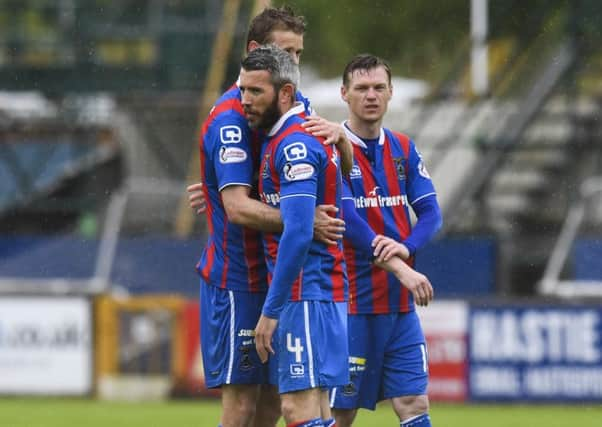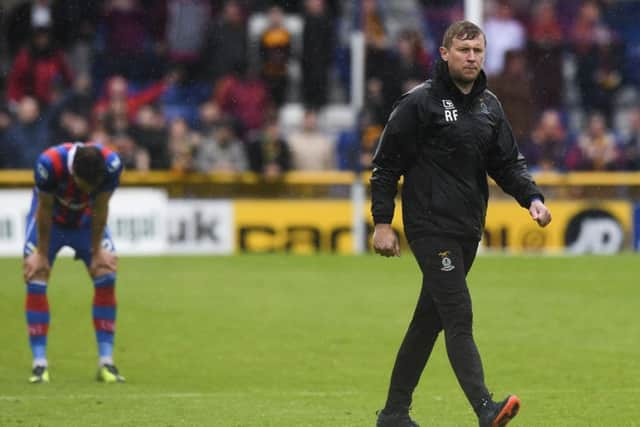The reasons behind Inverness CT's relegation


It’s been a long time coming. Inverness have been relegated from the Scottish Premiership after their latest seven-year stint in the top flight was brought to a conclusion. The emotions since expressed by supporters have ranged from anger and frustration to discontent and down right apathy but rarely, if at all, surprise.
Richie Foran might not have realised the full extent of the task he faced when appointed manager on a four-year contract last May but not even he can argue that the ‘continuity’ combined with ‘freshness’ that he promised has instead manifested in to something completely different. The result: a season which has been an unmitigated disaster.
Advertisement
Hide AdAdvertisement
Hide AdWe take a look back at where exactly it’s all gone wrong for the Highland club.


The recruitment
Recruitment problems at Inverness may have preceded the tenure of Richie Foran but they certainly haven’t eased since the club’s former captain stepped into the dugout. The Irishman has made no less than 12 signings in his debut season, bringing in a collection of midfield misfits and misfiring forwards propped up by the odd journeyman defender.
Looking at the list of names written next to one another, it’s difficult to conceive how a football manager could sculpt a team so ill-prepared for Premiership survival but remarkably Foran has somehow managed it. The return of Billy McKay perhaps acts as a minor saving grace but the striker has hardly been at peak prolificacy, netting just three times since returning to Inverness at the end of the January window. Admittedly, it’s difficult to imagine a fit Kevin McNaughton not making some sort of improvement to the squad’s defensive woes but the experienced full-back suffered an Achillies injury during the club’s second league game of the season against Ross County, thus ruling him out for much of the campaign.


Of the remaining ten, the majority have flattered to deceive, however, picking out just three can convey the lack of research behind Foran’s recruitment. After Caley’s 7-0 rout of Arbroath in the Betfred Cup group stages, supporters might have been forgiven for thinking Foran had unearthed a gem in Scott Boden. A hat-trick had brought the striker’s goal tally to four after his first four games but Boden has since failed to score in his last 12 appearances, most of which have been from the bench. The signing of Henri Anier was a classic case of taking a punt on a player who had previously flirted with form in the top tier. The manager might have been well-served in doing a bit more digging as to why it didn’t work out for the Estonian at Dundee United and Hibs, where the player consistently failed to deliver an end product. Then there’s Billy King, the winger who has shown glimpses of creativity in his career but is ultimately living off a fabricated reputation rather than performances of any real substance. King’s upbringing at Hearts, subsequent loan spell at Rangers and relatively young age seemed to convince the club’s shallow scouting system that a temporary move would be profitable. The transpiring reality, however, was of a player who struggled to inject life into the club’s wide areas.
The tactics
Tactical naivety has become somewhat of a theme throughout Foran’s tenure. The rookie manager’s decisions to play individuals out of position and drop players at questionable points in the season have evoked a sense of bemusement in the stands. Ross Draper has previously been scapegoated, and while the midfielder has experienced a dip in form, his qualities could have been key in building a team that was gritty and determined. In bringing him back into the team, Foran tried to push him into a more attacking position, which has resulted in him evolving into a forlorn figure trying to win aerial battles. Draper’s strengths are in breaking up play, noising up the opposition and doing the dirty work, a list of attributes that at one point had supporters of other premiership teams casting an envious eye over the midfielder. Now the player appears despondent and jaded.
Simply put, the team hasn’t discovered a footballing philosophy. They aren’t technical or physical, neither are they direct or possession-focused. The attractive style and methodology that the manager promised hasn’t materialised, and Caley fans have become familiar with a brand of hoofball lacking any real conviction or menace. The style hasn’t suited the personnel. A Greg Tansey playing to full potential is capable of dominating games with a range of passing and intelligence to compete with most premiership midfielders, yet more often than not the whole midfield has been by-passed altogether.
The manager has also failed to appropriately prepare his team for the opposition they face, highlighted by the consistent joy Ross County’s Liam Boyce has found in highland derbies, ghosting into pockets of space and forcing open the cracks of patched together backlines, or the freedom ex-player Jonny Hayes has experienced in terrorising the likes of Brad McKay or Gary Warren.
It hasn’t been justified for Foran to bemoan a lack of nastiness in the side when the team has long struggled for a coherent tactical structure and organisation that might have went some way to avoiding the concession of simple goals.
The manager as a personality
Advertisement
Hide AdAdvertisement
Hide AdWhen a player takes his first steps into management, a sense of intrigue develops as to how that individual will come across in the media. Will he convey charisma and innovation or will he be introverted and reserved? Foran’s manner with the press has been bizarre. The Irishman was regularly hyperbolic in his use of the familiar clichés, stressing that the players are too nice, that they need to be warriors and they must show character. When a manager isn’t concise and doesn’t communicate well, it can create a detachment between him and the support and this was something that became clear early on in the season and proved difficult for him to recover from.
It then becomes hard to imagine an individual, who carriers such an awkwardness in press conferences and interviews, motivating a group of players that has struggled for confidence throughout the season. While Foran was willing to take on responsibility for a poor run of results, he has done himself no favours by publicly criticising performances and questioning whether his players have the attitude to beat the drop.
Now that the inevitable has happened, the Inverness board face the potentially costly decision of whether to rip up the manager’s contract and start again. Chairman Kenny Cameron said following his appointment in the summer that it was only a matter of time before Foran stepped into management. Perhaps now it is only a matter of time before he bows out.
